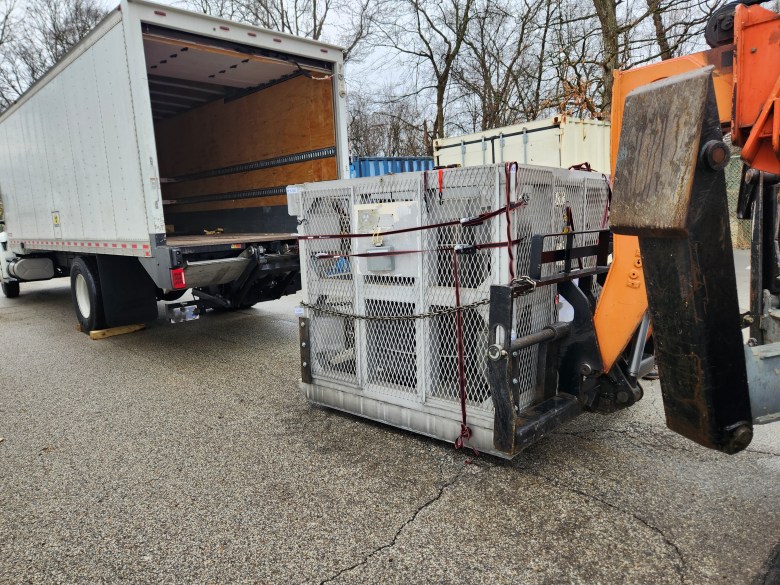WASHINGTON — Zeno Power Systems announced Jan. 26 it is working with the U.S. Department of Energy to recycle decades-old radioactive material to produce radioisotope power sources.
Under the agreement with DOE, Zeno will have access to a large supply of strontium-90, a radioisotope created as a byproduct in nuclear fission reactors. The company will use the material to build radioisotope power sources, or RPS systems. These are compact devices that convert heat from isotopes into electricity. NASA for decades has used RPS systems for deep-space missions, but these systems are fueled by plutonium-238, an isotope that is in limited supply. Zeno designed an RPS system for small satellites fueled by strontium-90.
The company, based in Seattle and in Washington, D.C., has several contracts to develop radioisotope-powered satellites for national security and space exploration missions, as well as underwater systems for the U.S. Navy.
Chief executive Tyler Bernstein, who co-founded Zeno in 2018, said the company is on track to deliver its first RPS-powered satellite to the U.S. Air Force by 2026.
DOE’s Oak Ridge Office of Environmental Management, known as OREM, is working with Zeno to recycle large quantities of strontium-90 from a radioisotope thermoelectric generator built in the mid-1980s at Oak Ridge National Laboratory, Tennessee, but never deployed. Before DOE agreed to hand it over to Zeno, the generator was expected to remain in storage for another 30 years before OREM could dispose of it.
Zeno earlier this week announced it partnered with Westinghouse Electric Co. to process the radioisotopes for its RPS heat sources.

OREM manager Jay Mullis called the agreement with Zeno a “win-win” as it helps remove a significant source of radioactivity at a DOE site while supporting nuclear-power innovation.
OREM is responsible for removing radioactive materials resulting from decades of nuclear weapons development and government-sponsored nuclear energy research at the Oak Ridge National Laboratory, Y-12 National Security Complex, and East Tennessee Technology Park.
OREM’s cleanup contractor United Cleanup Oak Ridge transported the radioisotope thermoelectric generator containing strontium-90 to a commercial nuclear facility at an undisclosed location in the Northeast, where Zeno will recycle the material to power its RPS.
Bernstein said Zeno designed its RPS to be fueled by strontium-90 because of its abundance. “It fills a demand that plutonium-238 cannot fill,” he told SpaceNews. “The Department of Energy can only produce enough plutonium-238 to fulfill marquee NASA missions.”
Zeno needed a fuel source to “build this technology at scale to meet the demand that we see in the coming decades,” Bernstein said. The company to date has won more than $40 million in contracts to build RPS powered satellites, and expects more orders, said Bernstein.
“The momentum for space nuclear power is only growing and you’re seeing this with broader support at the upper levels of the Pentagon, and you are seeing more commercial industry in this area developing these technologies,” he said.
The military wants spacecraft with increased mobility and endurance, he added. On the civil space side, the projected expansion of activities in cislunar and lunar environments is driving the need for a power source that is independent of the sun. “This can be critical to support operations in the cislunar domain,” Bernstein said.
- SEO Powered Content & PR Distribution. Get Amplified Today.
- PlatoData.Network Vertical Generative Ai. Empower Yourself. Access Here.
- PlatoAiStream. Web3 Intelligence. Knowledge Amplified. Access Here.
- PlatoESG. Carbon, CleanTech, Energy, Environment, Solar, Waste Management. Access Here.
- PlatoHealth. Biotech and Clinical Trials Intelligence. Access Here.
- Source: https://spacenews.com/zeno-to-recycle-decades-old-radioactive-material-to-fuel-its-radioisotope-power-systems/
- :has
- :is
- :where
- 1
- 2018
- 2026
- 26
- 30
- a
- abundance
- access
- activities
- added
- agreed
- Agreement
- AIR
- Air Force
- an
- and
- announced
- Another
- ARE
- AREA
- AS
- At
- based
- BE
- because
- before
- broader
- build
- built
- but
- by
- called
- CAN
- cannot
- civil
- CO
- coming
- commercial
- compact
- company
- complex
- Contractor
- contracts
- convert
- could
- created
- credit
- critical
- D.C.
- Date
- decades
- deliver
- Demand
- Department
- Department of Energy
- deployed
- designed
- develop
- developing
- Development
- Devices
- dispose
- DOE
- domain
- driving
- Earlier
- East
- Electric
- electricity
- energy
- enough
- environmental
- environments
- executive
- expansion
- expected
- expects
- exploration
- Facility
- fill
- fills
- First
- For
- Force
- from
- Fuel
- fueled
- Fulfill
- generator
- Growing
- hand
- Have
- he
- helps
- HTTPS
- in
- increased
- independent
- industry
- Innovation
- into
- isotopes
- IT
- ITS
- Jan
- jpg
- known
- laboratory
- large
- levels
- Limited
- location
- Lunar
- management
- manager
- material
- materials
- max-width
- Meet
- Military
- million
- missions
- mobility
- Momentum
- more
- Nasa
- National
- national security
- Need
- needed
- never
- nuclear
- Nuclear Energy
- Nuclear power
- Nuclear weapons
- oak
- Oak Ridge National Laboratory
- of
- Office
- on
- only
- Operations
- or
- orders
- over
- Park
- pentagon
- plato
- Plato Data Intelligence
- PlatoData
- power
- powered
- process
- produce
- projected
- remain
- remove
- removing
- research
- responsible
- resulting
- rps
- s
- Said
- satellite
- satellites
- Scale
- Seattle
- security
- see
- seeing
- several
- side
- significant
- site
- small
- Source
- Sources
- Space
- space exploration
- spacecraft
- storage
- Sun
- supply
- support
- Supporting
- system
- Systems
- Technologies
- Technology
- tennessee
- than
- that
- The
- These
- this
- this week
- to
- told
- track
- transported
- tyler
- u.s.
- U.S. Air Force
- U.S. Navy
- United
- use
- used
- wants
- was
- washington
- we
- Weapons
- week
- WELL
- while
- WHO
- will
- with
- Won
- working
- years
- you
- zephyrnet








